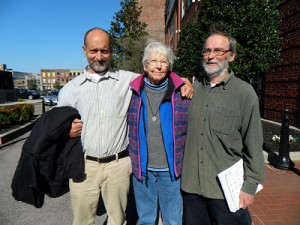
Pictured above are the three anti-nuclear weapons protesters who broke into the Y-12 National Security Complex on July 28, 2012, and vandalized a uranium storage building. From left, they are Michael Walli, Megan Rice, and Greg Boertje-Obed.
A federal judge has delayed for about an hour the Tuesday afternoon sentencing hearing for the three anti-nuclear weapons activists who cut through high-security fences and splashed human blood and spray-painted slogans on a uranium storage building at the Y-12 National Security Complex in July 2012.
The three protesters—Greg Boertje-Obed, Megan Rice, and Michael Walli—had originally been scheduled to have separate hearings starting at noon today (Tuesday) and continuing through 4 p.m. But in an order filed Tuesday morning, U.S. District Judge Amul R. Thapar said he would consolidate some aspects of the court’s analysis and allow all three defendants to remain in the courtroom during all three sentencing hearings.
The joint sentencing hearing will now start at 1:30 p.m. today (Tuesday) in U.S. District Court in Knoxville.
An earlier consolidated sentencing hearing on Jan. 28 was delayed due to snow.
Walli, a 64-year-old Catholic worker from Washington, D.C., is facing the longest potential sentence, a range of about seven to nine years, for the damage caused during the unprecedented security breach on July 28, 2012. Boertje-Obed, a 58-year-old painter from Duluth, Minn., has a recommended sentence of roughly six to eight years. Rice, an 84-year-old Catholic nun, has received the shortest recommended sentence, a range of about five to seven years.
Boertje-Obed, Rice, and Walli were convicted in May 2013 of destroying U.S. property and attempting to injure national defense premises. They were immediately incarcerated after their convictions.
The trio, who called their Y-12 operation Transform Now Plowshares, have said they were religiously motivated, and their actions were intended to symbolically disarm the 811-acre plant. Y-12 was built during World War II to enrich uranium for the world’s first atomic bombs as part of the top-secret Manhattan Project, and it continues to play a key role in the nation’s nuclear weapons complex, storing most of the nation’s highly enriched uranium, among other things.
However, prosecutors have argued that the security breach significantly disrupted Y-12 and interfered with the national defense. In addition to the two-week shutdown of nuclear operations and the damage to Y-12′s reputation, a secret shipment of materials that had been scheduled to arrive the day of the intrusion had to be delayed, prosecutors and government witnesses said.




Leave a Reply